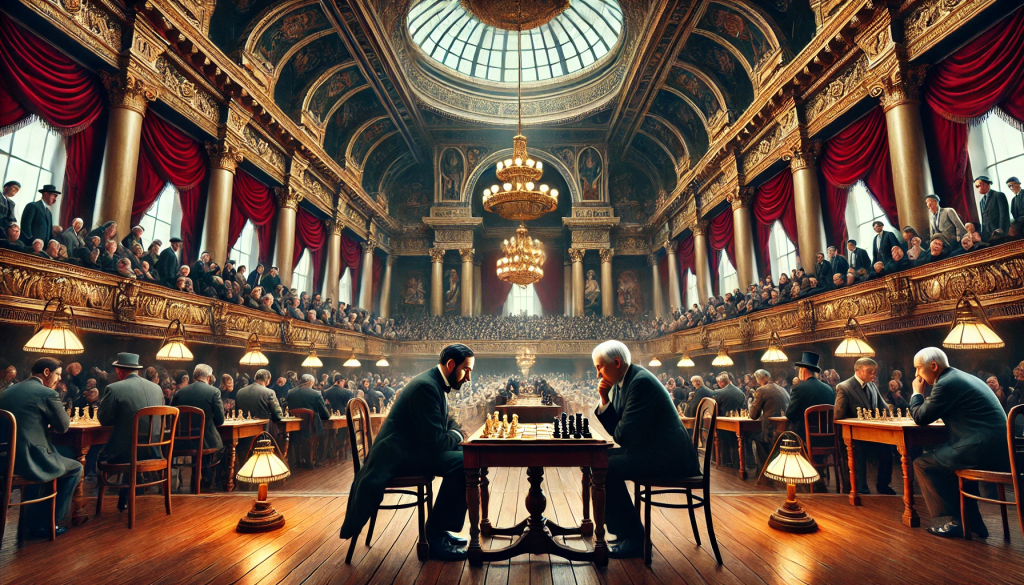
In the winter of 1939, a cold and anxious silence hung over the corridors of power in Moscow. At a desk sat Mikhail Botvinnik, 27 years old, with a simple yet monumental dream: to play a world championship match against Alexander Alekhine, the titan of the chess world. He had received the green light from the highest level – a personal blessing from Stalin himself – but every step forward felt like walking on ice that threatened to crack.
A Meeting in the Heart of Europe
It all began in late 1938 during the prestigious AVRO tournament in the Netherlands. The event had gathered eight of the world’s best players to determine who was the leading contender to challenge world champion Alekhine in a future title match. Among the participants were legends like José Raúl Capablanca, former world champion, and Paul Keres, a rising star from Estonia. Alekhine himself had a mediocre tournament, finishing sixth, while Botvinnik impressed and ended up in third place.
After the tournament, a meeting was arranged between Alekhine and Botvinnik at a hotel in Haarlem. It was a cold November evening, and the smoky hotel bar buzzed with chatter from tournament players and spectators. Botvinnik, nervous but determined, took the initiative.
“I have an idea,” said Botvinnik, leaning across the table. His Russian broke through the French conversation.
Alekhine looked up from his glass of red wine and smiled faintly, a mix of curiosity and weariness in his eyes. “An idea? If it’s about chess, I’m always interested.”
“A match,” Botvinnik continued. “You and me. In Moscow. Let the world see what the Soviet Union has to offer.”
A moment of tension followed. Alekhine, an exiled Russian who had left his homeland in 1921 and never returned, knew that such a match would be more than just a game. It would be politics, propaganda, and prestige. But his love for chess—and perhaps a longing to reconnect with his homeland—made him nod.
“I accept—if Moscow does.”
The Status of a World Champion
At the time, Alexander Alekhine was still a mythical figure in the chess world, even though his position as world champion was beginning to be questioned. He had first claimed the title in 1927 by defeating José Raúl Capablanca in a legendary match, but his playing strength had declined over the years. Critics pointed to his age, increasingly inconsistent performances, and his reputation as an alcoholic.
Still, Alekhine remained a charismatic figure. His style, which blended brilliant creativity with deep tactical understanding, had inspired generations of players. Though he was beloved in the West, his relationship with the Soviet Union was more complicated. Many there viewed him as a traitor for having left the country during the chaos of the revolution. But in later years, he had tried to mend his reputation by sending friendly messages to Soviet players and even expressing a wish to return.
Soviet Chess’s New Hope
On the other side of the board stood Mikhail Botvinnik, a product of the Soviet effort to turn chess into an ideological weapon. Botvinnik was not just an exceptional player—he was also a symbol of the new Soviet man. His disciplined and scientific approach to the game reflected the Communist dream of a new kind of human being: rational, hardworking, and loyal to the state.
Despite his international successes, Botvinnik had not yet proven himself to be the world’s best player. His ambition to face Alekhine was therefore both personal and political.
Approval from the Kremlin
When Botvinnik returned to Moscow from the AVRO tournament, he immediately became a man on a mission. He used his government contacts to push for the match. Among his allies was Nikolai Bulganin, a high-ranking politician with an interest in chess. In January 1939, the breakthrough came. A telegram arrived from Molotov’s office:
“If you challenge Alekhine, we wish you success. The rest can be easily arranged.”
Botvinnik smiled. He knew that these words, though signed by Molotov, were Stalin’s own. Plans began to take shape. The match was to be held in the Column Hall in Moscow, a symbolic venue of Soviet power and culture. A thousand spectators would fill the hall, and the match would be marketed as a triumph of socialism’s superiority.
The Power Struggle Begins
But not everyone was enthusiastic. Vladimir Snegov, head of the All-Union Committee for Physical Culture and Sports, saw the match as a potential disaster. If Botvinnik were to lose to Alekhine—a defector and symbol of Tsarist Russia—it would be an ideological defeat. Snegov began actively stalling the process. He pointed to logistical issues, questioned Alekhine’s loyalty, and demanded more details about the budget.
Botvinnik, frustrated but determined, tried to navigate around the obstacles. He wrote letters, held meetings, and even visited the Kremlin personally to get things moving. But every step forward was followed by two steps back.
A Match Date That Never Came
By the spring of 1940, it seemed the match would finally happen. A date was set for the autumn, and preparations were nearly complete. But then world politics intervened. Nazi Germany invaded France, and Alekhine, who was in Paris, became trapped in occupied Europe.
In June 1940, Vyshinsky, one of Stalin’s right-hand men, drew a line through the document containing the match details. “This matter is no longer relevant,” he wrote briefly.
Epilogue
After the war, in 1946, Botvinnik made one last attempt to arrange the match. He sent a telegram to Alekhine: “Let’s do this. The world is waiting.” But Alekhine, gravely ill by then, never had a chance to reply. He died in March that year, alone in a hotel room in Portugal.
Botvinnik would later become world champion, but he always knew that his greatest challenge never came to be. The match between him and Alekhine remained a dream—a match that only ever played out in the imagination.
Leave a Reply
You must be logged in to post a comment.